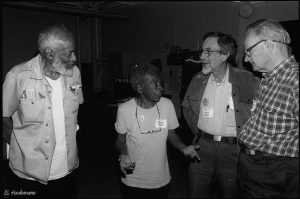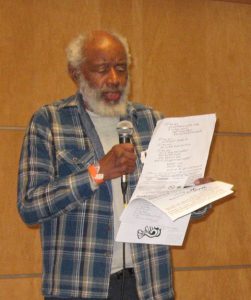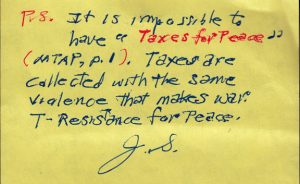The longest term war tax resisters (l to r) Joffre Stewart, Juanita Nelson, Karl Meyer and Brad Lyttle at the 2005 WTR strategy conference in NYC. Photo by Ed Hedemann.
Joffre Stewart died in his hometown Chicago at age 93 on March 12. He became a dedicated nonviolent resister to war and injustice out of a short stint in the military during WWII when he went to prison for going AWOL. Early on he found his political home with the revolutionary pacifism and direct action of Peacemakers, a group founded in the late 1940s by Ernest and Marion Bromley and Juanita and Wally Nelson. He carried his anarchist-pacifist politics with him for the rest of his life, although Joffre was not someone who fit easily into a group. He was a poet and might have known every open mic poetry night in Chicago; he had a great voice for recitation, but it wasn’t always easy to comprehend or accept the content.
I first met him in person at the International Conference of War Tax Resisters and Peace Tax Campaigns in Washington, DC, in 2000, which was organized and hosted by the National Campaign for a Peace Tax Fund and NWTRCC. I knew of Joffre from the late 1980s because his mailings, with writing all over the outside of the envelope, frequently turned up in the mailbag at the War Resisters League where I worked.
At the 2000 conference, Joffre’s name was announced from the stage because he was being publicly censured for passing out leaflets that were felt as offensive and antisemitic by many attendees. Digging through movement records one finds interviews with Joffre at least back to the 1970s that discuss these charges with him. He couldn’t see it; he was anti-state and adamantly anti-Zionist but didn’t accept the charge of antisemitism. Despite his denials, his writings often incorporated the swastika among other symbols and continued to offend. Still, he did not change.
Nevertheless, I was intrigued to meet him in person and was shocked to find a soft-spoken engaging person with impressive stories from his history of activism (here’s sample from a Peacemakers’ write-up in 1950).
Through most of the 2000s and until Joffre became too frail to travel at about age 91, he came to most of the twice-yearly gatherings of NWTRCC. He’d often arrive early and be the first to greet people with his latest legal-size, 2-page flyer featuring one of his poems full of symbols plus some bits copied from our newsletter or other mailings. Many of our meetings had to include a disclaimer: “those handouts are by one person and do not reflect the beliefs of this organization.” He’d lay waste to a lot of good work by blocking proposals because of one word or phrase or any mention of legislation.
At times there were conversations about whether he should be banned, but those of us who were regulars at the meetings never came to such an agreement. Joffre did have something of a winning personality, and he was so damn dedicated to REVOLUTIONARY NONVIOLENT DISOBEDIENCE, as he might write. Joffre’s anarcho-pacifism continually challenged us to think before saying “my state,” “my government,” or “taxes for peace” (see graphic). When people would talk about nuclear disarmament, he would clarify that one nuclear weapon is too many. In response to an article explaining presentations of military budget percentages he wrote “1% of a ‘defense’ budget is more than enuf to destroy our world.”
Stories of his arrests for leafleting, or the time he took the bus to our meeting in Tucson and the border patrol hassled him at a checkpoint, reminded our predominantly white group that living while black is a whole other experience. He was resourceful and somehow found his way to our meeting location when his bus was way late or the person who was to pick him up couldn’t find him. All of us who knew him can share lots of stories — funny ones too. (I mean, really, Joffre visiting the Las Vegas strip. It was incongruous.)
Thinking about Joffre gets me thinking about group process and all the dynamics involved in trying to keep a group together, welcome in new people, and get business done. Certainly our meetings became easier without this one-of-a-kind thinker. In many difficult group situations it might be necessary to resort to mediation or other measures to deal with a problem and avoid a total rupture. Joffre wasn’t really “mediatable”; he’d listen to criticism, maybe argue back, and carry on. It was just how he was.
Perhaps just out of softness of heart NWTRCC gave Joffre a political home, but it didn’t go unappreciated as illustrated in these stanzas from his poem about the suicide of Malachi Ritscher. Joffre was at a NWTRCC gathering at the time of his Chicago friend’s death.
So while I was in Vegas
plotting with tax-resisters
to move resistance into mass movement
Malachi committed the ultimate act
of tax resistance:
taking himself permanently
Out of the Infernal Revenue SystemHad he known about us
he might be letting his little light shine
rather than having his
Millennium Flame
doused, smothered, hidden, suppressed
by the patriotically polluted overflow
of MainStream MediaIf I believed in heaven I could imagine Joffre standing at the pearly gates with his bag of leaflets, definitely not going in, but handing his flyers to all the unwitting takers.
— Ruth Benn
P.S. One more link from David Gross’s blog, which also takes you to the obit from a Chicago friend of Joffre’s.
5 thoughts on “RIP Joffre: A tireless resister — who could try patience”
Comments are closed.




Thanks for this, Ruth. For sure he was a complicated and stubborn guy, but I learned some things from him – maybe not what he wanted me to learn, but anyway. 😀 Definitely the importance of avoiding anti-semitism in criticism of Israel, anyway, and others’ critiques of him encouraged me to be more outspoken about apparent/actual anti-semitism.
I remember him telling a bit of the story of his time in the military at our Tucson gathering in 2010, being really taken by his storytelling – not often hearing him tell stories in that way.
And yeah, I think Joffre would leaflet outside the gates of heaven for all time.
Joffre was a consistent friend with me for 62 years in the Peacemaker movement, all anti-war actions, draft refusal movement, war tax refusal movement and WTR support group in Chicago, from the time when I first met him in 1957 in my last year at the University of Chicago. I learned a lot from him about accuracy in language and how the Orwellian euphemisms we often succumb to corrupt the understanding of our world. It is not the Defense Department or the defense budget. Until 1946 it was honestly called the War Department. Yet throughout the lifetimes of all now living it has actually been the Aggression Department, consuming the military spending budget.It wasn’t our war in Vietnam; it was the U.S. Government war. Joffre and I were not citizens of the United States. It was an organization we would never join.
I did join the Catholic Church (no longer practicing for many years). When Joffre spoke at my little Catholic Worker shelter for homeless people in 1968, he spread a full sized American flag at the threshold for people to wipe their feet. As a Gandhian I don’t handle other people’s cherished symbols that way, but I didn’t object. Everyone attending stepped over it. He burned miniature American and Vatican flags during his talk, to illustrate his anarchist objection to all political states. He called the Catholic Worker “the little Vatican bastard by the Bowery.”
Like Wally and Juanita, Ernest Bromley, Maurice McCrackin and Eroseanna Robinson, mentors to me in war tax refusal, he went limp and into a state of complete non-compliance and complete fast whenever arrested and I helped him with outside protest and support several times until his release.
In meetings he stated his position quietly, in forceful and articulate voice, but he didn’t harangue or try to dominate conversation with long tirades.
He became obsessed with special opposition to Zionism and the Israeli State after being assaulted and beaten by thugs from Meir Kahane’s Jewish Defence League while leafleting outside an Israel Bond Drive fundraiser. I do not believe he was anti-semitic as such, but it took a careful reading of his leaflets and an understanding of his particular jargon to discriminate a difference, He used the swastika in spelling to indicate an analogy between Naziism, apartheid, and some Israeli treatment of Palestinians; he spelled Amerikkka with three ks to indicate the persistence of racism in government and culture, not to endorse these ideologies, but to expose and oppose them. Kathy Kelly and I sometimes took steps to distinguish his particular message from ours in organizing WTR actions in Chicago.
A good friend lost. The bell tolls for him, and before too long for me and for thee.
Karl Meyer, 2407 Heiman St., Nashville, TN 37208
.
Thanks for Erica’s note and more background, Karl. There was no one like Joffre.
Thank you for this piece, Ruth, and I appreciate the comments also. I recall the first time I received a letter such as you describe from Joffre, and I was all concerned, picturing him as a young, white skinhead trolling war tax resisters. I wrote you about the letter (or letters – I think there was a batch of them), and you put me at ease. “Ah, Joffre.” When I finally met him at a NWTRCC meeting, I was surprised, as you note, by his gentle demeanor. It’s true, we learn from everyone.
Wow. These and the posts to wtr-s listserve about Joffre are so great! There isn’t anything new I can say. I too feel like I’ve lost a friend, though, of course, I really only ever saw Joffre at NWTRCC gatherings. I, too, received his weird letters long before I ever met him, and I, too, first met him at that International Conference in DC. We were bunkmates, but I can’t remember which one of us got the bottom bunk.
And for, me, too, my favorite Joffre story is that ramble through the Strip in Las Vegas. “Incongruous” is not sufficient to describe the absolute deliciousness of walking with this rabid anti-capitalist, anti-Zionist stalwart through Sheldon Adelson’s Venetian Hotel. It was simply too much to hold together in my poor little brain!
I will probably always find myself, when we are deep in discussion at meetings, thinking to myself “What would Joffre say?” That’s a testimony to his own brand of clarity. And if it helps us with ours, so much the better. For all the times we may have wished you hadn’t been there, Joffre, you are missed.